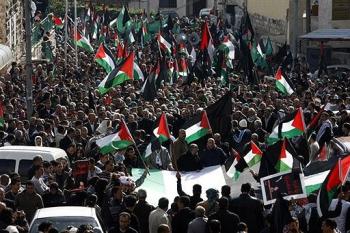-Mike Kay
The carnage rained down on Gaza has had a profound effect on the activism of Arabs within Israel. Around 1.5 million Arabs remain living within Israel’s pre-1967 borders. They constitute about 20% of the population, but are treated as second-class citizens. The past few weeks have seen large anti-war demos by Palestinians and some Jews. Not surprisingly, these acts of defiance have been met with clamp-downs by the Israeli state. As Karl Marx put it, “a nation that enslaves another forges its own chains.”
At least 100,000 in people demonstrated in the northern Arab town of Sakhnin and in Tel Aviv against the assault on Gaza on 3 January. According to organisers, Sakhnin was the largest protest held by the Palestinians in Israel in many years. During the first two weeks of “Operation Cast Lead”, 471 protesters were arrested in Israel, including 149 minors. Almost all of those detained were Arabs.
The Tel Aviv protest took place in the face of opposition from far-right Zionists and the police. Among other things, the police demanded that the organisers undertake to prevent the hoisting of Palestinian flags. The organisers petitioned the High Court of Justice, which decided that the Palestinian flag is legal and ordered the police to protect the demonstration from rioters. However, according to Israeli peace group Gush Shalom, the police disappeared towards the end of the march, allowing the far right to attack and disperse the protesters, preventing a planned rally from going ahead.
Israeli Army reservists who refuse to serve in the Occupied Territories have also held their own protests since the start of the latest Israeli offensive.
But the struggle is not confined to the streets. Within the last week, the Israeli Central Elections Committee has overwhelmingly voted to disqualify the only two exclusively Arab parliamentary parties in Israel from participating in February’s election. Balad and United Arab List-Ta’al, who together hold seven of the 120 parliamentary seats, were banned after being accused of not recognising the country’s right to exist. The petition was sponsored by two ultra-nationalist Jewish parties who are whipping up the idea that Arabs have no place at all in Israel. This view seems to be permeating into the political mainstream with Tsipi Livni, the Israeli foreign minister and prime ministerial candidate, suggesting that the future creation of a Palestinian state would offer a “national solution” for Arab citizens of Israel.
The argument for Israel being a democratic country is as shaky as a bombed out Gaza apartment block.
